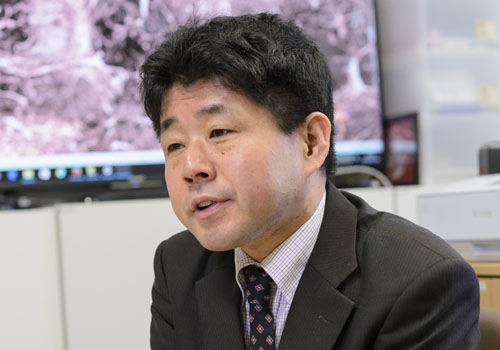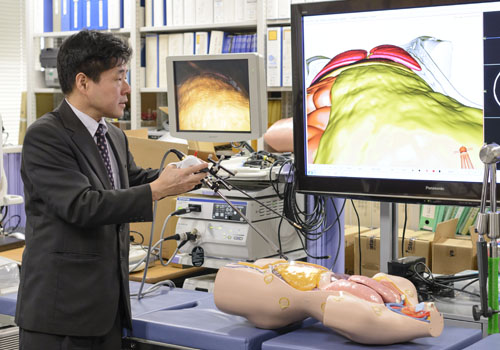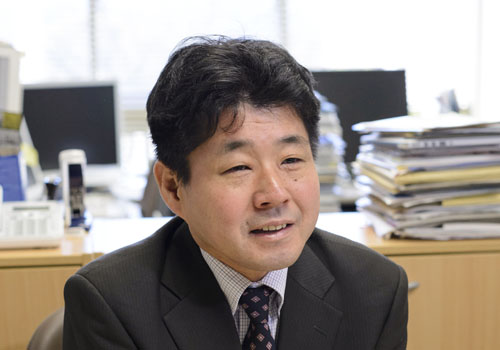
Special interview

An Expansive Field of Study with the Power to Make Dreams a Reality
Kensaku Mori
Professor
【Graduate School of Informatics】
Department of Intelligent Systems
【School of Informatics】
Department of Computer Science

Systems that automatically detect illness
-What are you working on right now?
The researchers in our lab use computers to process medical images with technologies like computed tomography (CT) and magnetic resonance imaging (MRI). We're making devices that can automatically detect cancers or polyps, building models of human organs using 3D printers, developing navigation systems that can tell physicians where to cut during surgery—things like that. More recently, we have been doing research with the physicians at the School of Medicine to process extremely high-resolution CT images taken with what we call a microscopic CT device. The doctors often come to our lab to discuss our work. So we're not just an isolated field of expertise—our research also has some breadth to it.
Considering social impact as well as having expert knowledge
-What do you need to know or be aware of to work in your field?
To start, you need to know about mathematics. Then you need knowledge of computers. Because we're developing the algorithms and programs for image processing, extracting the information we need from the medical images to create models of the organs, developing ways to build them using 3D printers, and researching surgical techniques that actually incorporate those models, our scientists need to have a comprehensive knowledge base.
Of course these days, it's difficult to get anywhere with a research project that only addresses computerized image processing. People also want to see that you're doing something that will benefit society. For example, if we want incorporate our organ models in surgical procedures, we've got to have them legally approved under pharmaceutical and medical device laws before physicians can actually use them. Before our research can be broadly applied, we've got to get the state to approve it under the Act on Pharmaceuticals and Medical Devices and then get health insurance to cover it as well. Obviously we can't go changing the way the world works, so it is important that our researchers not only have the knowledge they need in terms of straight information, but are also able to consider how things are likely to play out in the future. They've got to listen carefully at academic conferences and similar events so they can acquire this kind of knowledge as well.

Aiding surgery with… car navigation systems for hospitals?
-How do your ideas and research tie into our everyday lives?
When physicians detect illness using CT technology, they use a system where a computer automatically points out what they are looking for. We are actually working with doctors at Nagoya University Hospital and the Aichi Cancer Center to implement surgical navigation techniques. When they put an endoscope in someone's abdomen to do surgery, the system works with the camera to indicate what they are currently looking at and what blood vessels are in the area—so you can think of it as a kind of car navigation system for hospitals, where the nerves and blood vessels are like roads. We can extract the blood vessel information from the CT images, but those images are in black and white. So the computer processes them to make the arteries red, the veins blue, the liver brown, for example, and the pancreas yellow. The information then comes out looking like a map on your car navigation screen. This technology has already helped a lot of different patients undergoing surgery.
Fueled by "Fascinating!" and "Thank you."
-What made you decide to get into this research?
I read a book describing the research that the department was doing, and I immediately thought it looked fascinating. You all are probably looking at these brochures and videos and thinking about where we might take this research in the future, and I believe we're going to see a lot of these ideas become a reality. The organ models we're currently building with 3D printers are rigid, but we'll probably start seeing soft ones—and even develop a kind of display device that we can put inside them to show information. One of the things we're working on, for example, is creating something that will display a number in the model when physicians make some kind of gesture indicating that they want to know how many centimeters there are from one point to another. It sounds like science fiction! The closer we get to the feel of a real organ in terms of weight, water content, bendability, and so on, the better research we can do. There are so many possibilities waiting to be discovered—like models that can actually be cut with a scalpel and used to simulate a surgery before it happens.
The people on my team and the thank-yous we get from physicians and patients are what keep me going.

Gradual evolution in the field gives rise to even more areas of study
-What message can you give students looking to get into the School of Informatics?
At the School of Informatics, you can learn things that are useful in so many areas of society—primarily using computers to address the social and technological issues that surround us. We actually do research presentations with psychology professors, analyzing everything that is said in an operating room to figure out what physicians talk about when they use our organ models during surgery, what the situation is like, and so on. Our research is really built on powerful collaboration. When you're trying to achieve something that you could hardly dream of, it's unlikely that you'll be able to do it by yourself. You need all kinds of people doing all kinds of different things in order to generate synergy. The informatics can't exist without professors working in psychology or cognitive sciences, and this gives the field a tremendous amount of depth.
There are some things that I wondered what we were going to do with when I was a student that now have real-world applications. In the same way, all kinds of things are likely to happen as the students now testing to get into the department grow and develop. I hope they feel a sense of excitement about this.
The School of Informatics may be the broadest academic department we have at Nagoya University, and I would love for more people to choose to work in the field.
